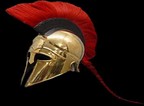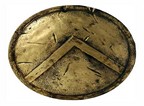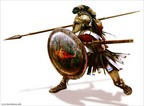The Sicilian war or the Sicilian Expedition (415-413 BC) was actually the fatal bash for the peace and led to the start of the second Peloponnesian War. In Sicily, the greatest battle of the entire Peloponnesian War took place and determined in advance the end of this conflict after 10 years. The Athenian historian Thucydides lived and wrote down the facts of the entire Peloponnesian War while his writings about the Sicilian War were of his most dramatic.
The reason for the campaign was Segesta, a town of the north-western part of Sicily which was in conflict with the neighbouring town of Selinunte. Selinunte was an ancient Greek town, supported by Syracuse. Segesta sent to Athens delegates to ask for help. However, the real reason was this; the desire of the Athenians to occupy the entire area of Sicily. Alcibiades, a young and ambitious politic, subtly took the advantage of this desire.
Alcibiades was a really intelligent but also an irresponsible personality who saw the Sicilian Expedition as an opportunity to satisfy his desires and his unlimited ambitious for glory and power. With his convincing speeches, made the Athenians to decide for the Expedition and he became one of the 3 generals who led the Athenian army to Sicily. However, some days before the departing of the army for Sicily, a great scandal erupted. A sacrilegious act against the god Hermes upset the Athenians and it was interpreted as a bad omen in view of the campaign, but also gave a political significance considering the part of conspiracy to overthrow the republic. Rumours show Alcibiades as a guilty for this corrupt act. However, due to the lack of evidence he was allowed to lead the Athenian fleet to Sicily as was decided.
The Athenian fleet finally started its journey from the port of Piraeus in the summer of 415 BC and it was the most impressive which had ever left from a Greek port. First stop of the journey was Corfu where the Athenians and their allies met with more allied forces. The entire military force was consisted of 150 ships (military and auxiliary), and more than 25.000 men. The Sicilian towns were extremely unfriendly with the Athenian fleet while some of them didn’t even allow them water replenishment in their ground.
The first defeat
Before the beginning of the battles in Sicily, an unexpected fact upset the Athenian forces; Athens was recalling Alcibiades to judge him for the blasphemy. Alcibiades seemed to give up but during the returning to home misled his guards and escaped to find asylum to the greatest enemy of Athens; Sparta. This unexpected fact reversed the strategic plans of the Athenians and had a serious negative effect on the morale of the army.
In the spring of 414 BC the forces entered into a decisive stage for the final assault against Syracuse. The situation was extremely favorable to the Athenians and it seemed that Syracuse was not far from falling into their hands.
However, the situation changed when the Spartans decided to follow the advice of Alcibiades and sent forces to Syracuse. Things now began to become more and more difficult for the Athenians. Conflicts with the enemy wore their strengths and their opponents took the upper hand. Nicias was seriously worried about the fate of the expeditionary corps. Therefore requested aid from Athens, which arrived in two sections and some delay, the first part in the spring of 413 BC under the general Eurymedon and the second after July of the same year under the general Demosthenes. Demosthenes decided to attack the superficial walled and steep plateau to the north of Syracuse. The first phase of the operation went well for the expeditors. The Syracusans and their allies were not expecting the attack, taken aback and could not react. However, the first reaction came from a unit of Boeotians, who achieved not only to stem the Athenian attack but also to chase them away.
From that moment onwards, the Athenians came in indescribable confusion. The Syracusans from their side exploited the best way the confusion of the enemy causing it great losses. Some Athenians were thrown into the cliff and killed. Others were able to return to their camp and be saved. Others lost their way and ended up in the valley. When it dawned, they were surrounded by the Syracusans and then slaughtered.
The great naval combat
The Athenian army was now exhausted by the diseases, the continuous battles and the nightmare of malaria. Demosthenes proposed the ending of the campaign and the return back to home. So he gave the order to dissolve the camp. But when everything was ready for their departure, became lunar eclipse. Many Athenians saw it as a bad omen and asked to postpone the departure. Nicias, as an extremely superstitious person refused to depart before the passing of 27 days (3 times the number 9 as the augurs said).
The Syracusans understanding the difficulties of their enemy and being supported by more allies, started to attack the Athenian powers. The second day attacked with 76 ships the Athenian fleet of the 86 ships while fighting them on the land. The brunt of the opponents was great and the area of the port was too small for so many ships, nearly 200 all together. There was not enough space for manoeuvring the ships and hit between them, and often, when two of them were stuck together due to stroke, a third was coming and stick to them, and could not be removed from one another. The noise was deafening from the continuous collisions of the ships while the arrows, spears and stones were like rainfall.
Winners of the violent battle were the Syracusans. They chased away the Athenians, of whom those who were lost at sea, came ashore and ran to be saved in their camp.
The final disaster
The Athenians had now no alternative choice and they tried to escape by land to a friendly area. They started on the third day after the battle, divided into two parts, one under Nicias and one under Demosthenes and their trip lasted eight days. However, it was not a journey to salvation but to devastation.
The Athenian army was being shot by the following enemy and started to give up. The Athenians reached a river not only to save themselves but also to quench their thirst when the Peloponnesians came there and started to slaughter them. The river changed to red because of the blood while the livings were still drinking…
The fate of the captives was tragic. The generals Nicias and Demosthenes were executed publicly. Incredibly small was the number of those who were able to go home from the total of the 40.000-50.000 men who had taken part in the Sicilian War. Meanwhile in Greece, the Peloponnesian War had resumed with all its ferocity. It would last another 10 years, until 404 BC, and would end with the final defeat of Athens.





